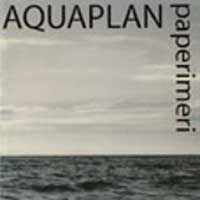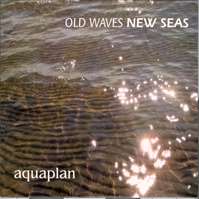AQUAPLAN are a new Finnish band who blend prog rock with folk and are somewhat reminiscent of TURQUOISE and MOSTLY AUTUMN. Their idea is to create music that combines prog's challenging structures and time signatures with a bit of jazz, while still retaining the accessibility of pop and the sensitivity of folk. They started as a tribute band covering Frank ZAPPA but soon went on to perform their own material, newly tinted by the smooth vocals of Maarit Saarenkunnas who sings with great feeling.
(words by Lise (HIBOU), CANADA)
I contacted the band for their story so far. Both Maarit and Ville answered my questions.
When and by whom was Aquaplan formed and was and what is your
musical philosophy ? Why did you choose that name?
†
[Maarit]: Aquaplan was formed by Ari 'Suti' Sutinen in 1999. I remember
complaining my boring musical life in a local bus to Suti, who replied
by asking me to join his new group. I said yes, before I had heard what
kind of music they were planning to write. I havenít had any regrets,
despite the fact that I hardly ever listen to progressive rock myself -
I enjoy making it though. I consider myself extremely lucky for being
accepted in a group of such talented musicians.
We all want to make music, which does not bore us but challenges instead
and gives space for experimenting. Suti creates melodic and ambitious
music by combining elements of pop, fusion-jazz, folk and prog... or
anything that the band might come up with.
The name was chosen mainly because we thought that it fits in the mouth
of speakers of many languages. And the connection to water seems to suit
us well, because water-related metaphors are widely used in our lyrics.
†
To start with; please give me your (long or brief) thoughts and
lowdowns on your two albums.......
†

[Ville]: Paperimeri was our first album released back in 2003. The music
is quite song-oriented, although there are one or two more extended
tracks also. Most songs were performed in Finnish, and in addition to
Maarit also Suti's wife Terhi-Liisa contributed to the lyrics.

On 'Old Waves New Seas' (2006), we took a step into more experimental
and ambitious direction, and changed the language to English. The
general feeling of the album is a bit heavier and darker, which can be
explained at least in part by the new drummer Oikku, who joined the band
at this point. There have been no changes to the line-up since by the
way. OWNS could be approached as a theme album, as there are some
cyclical musical themes, and the first and last track operate as sort of
bookends, holding the rest of the tracks together.
†
[Maarit]: Lyrically the album handles mainly the joys and sorrows of
ordinary life, living in the peak of adulthood: being busy in both the
positive and negative sense of the word, having the strength and means
to do things, but being forced to choose between the many opportunities
life offers...
Please describe how Aquaplan's music gets created?
†
[Ville]: One distictive thing in Aquaplan's creative process is the fact
that the lyrics are written before the music, which results often in
non-standard rhythms and structures in the songs. Nowadays Maarit
provides all the lyrics and Suti comes up with the chords and melodies
to suit the atmosphere. So the whole starting point is very vocal and
melody oriented. Suti's harmonic ideals can be traced to the world of
jazz, as he likes to use quite wide chords and avoid classical oriented
tension and resolution philosophy. This is one of the key
characteristics, which makes Aquaplan sound so unique.
When the vocal parts are beginning to find their shape and character,
Suti usually creates a bunch of instrumental sections and themes. They
are often written in a more guitar-riff oriented fashion. The idea is to
create some contrast to the often laid-back atmosphere of the verses.
After this the whole band comes into the picture, and pretty much
anything can happen... Sometimes the song works just 'as it is', and
there's no need to for any big manoeuvres. In other cases, we might end
up making quite big changes, such as introducing different tempos to
different parts, changing the character or over-all structure of the
song, whole new parts may get introduced from variations of original
riffs & themes etc. The arrangement process may take quite a long time
actually, and some passages can take a different form in just about
every session... Still the most important aspect in the arrangement
process remains in the vocal line and finding the right atmosphere and a
good flow for the song. Thus, any sort of complexity tends to get hidden
in the final outcome.
†
What is the latest update on your band?
[Ville]: We are alive and well! We are in the last stages of arranging
and rehearsing the music for a new studio album. Recordings will start
later this year, but it is too early to give a release date.
†
†
I guess Mostly Autumn is a good reference point for your music.
But how would you describe your music and who would you compare yourself
with?
†
[Maarit]: We have a healthy appetite for music, which means that we
listen to all kinds of good music from classical music to progressive
rock, pop, folk and jazz. We have been compared, for example, to
Marillion, Joni Mitchell, Iona, Mostly Autumn, Renaissance, and Clannad.
One of Ariís all time favourites is Frank Zappa. Then again, Pasi is a
devoted bluegrass fan. Lately Ville, the master of the bass, has shown
slightly alarming tendencies towards the heaviest kind of metal music. I
have choir music close to my heart and lately I have, among other
musical activities, been singing Bach in Oulu Cathedral Choir. I guess,
this is one the main strengths of this band: we take influences from a
very wide musical scene and bring those with us to our music.
†
[Ville]: Our reviewers have made many references to Celtic rock bands,
which has been some sort of surprise to us, as we didn't aim to sound
like that. Perhaps the usage of acoustic guitars, Maarit's singing style
and general attitude of the musicians are the main factor leading to
that kind of association. On the other hand the jazzy harmonic basis in
our music is quite different from the Celtic scene, and we are not
trying to sound quite so symphonic either as some of those groups.
†
Kalevala is a great contribution to the cultural scene from
Finland. Your country also have an excellent folk music scene. A scene
and tradition often (mis)used by the metal scene in Finland. How does
this very lively folk music scene in Finland influence your music ?
†
†
[Maarit]: You are quite right. There are many fascinating things going
on in the Finnish folk-music scene. In fact, at the moment it may be the
music scene in Finland where the most interesting developments occur.
Progressive music and the current folk music are certainly related to
each other, since neither of them aim at pleasing by providing obvious
and easy soundscapes, but instead have an exploratory attitude. In
addition to the spiritual kinship, there is a more concrete connection
between our band and folk, because both I and Pasi have a keen interest
in folk music. Kaustinen and Haapavesi Folk Music Festivals are a high
priority in my summer programme.
†
†
What is the availability of your albums and what is your
experiences with the music industry ?
†
[Maarit]: We produce and publish our music through our own channels
(Sound of Wood) and co-operate with few specialized distributors such as
Musea, Record Heaven and CDBaby. This gives us the power to make all
decisions concerning our music by ourselves.
[Ville]: Our latest album is available at Spotify for streaming, and
there's a number of online-stores offering downloading possibility too.
That gives an easy way for new listener's to learn what we sound like.
†
How is the gig situation for your band ?
†
[Maarit]: We are very lazy in going out and therefore we have not
actively sought for gig opportunities. We have only a couple of live
performances per year, because our main interest lies in producing new
music together. Furthermore, there are not that many music clubs in
Finland that wish to promote music like ours. Music clubs and festivals
tend to hire bands, which are guaranteed to sell a lot and are regularly
heard in radio and TV. Marginal music does not have too many good
venues. However, it is good to get out of the studio every once in a
while. At the moment we are working with new material. After it is in a
more or less publishable shape, we have thought of maybe producing a
streamed live performance over the Internet.
†
Do you have any regrets in your career ??
†
[Maarit]: None :-). Frankly, I wish I had twice the time I have for
making music.
†
How do you see the future of Aquaplan?
†
[Maarit]: Weíll work as we have worked so far: slowly and steadily,
trying to challenge ourselves to produce something new. The main purpose
of this band for its members is to be an arena where we can experiment
and enjoy each othersí musicianship.
†
What is your five all-time favourite albums?
†
[Maarit]: I could give you a list of fifty things I like. Lately I have
been listening to the following:
Pekka Kuusisto & Luomu Players, Folk trip; Plant & Krauss, Raising Sand;
Rajaton, Nova; Sting, If on a Winterís Night; Faurť, Requiem.
[Ville]: Ouch, this is a tough one. I'll follow Maarit's example and
just list some albums I've been listening to lately:
Sibelius : Kullervo (well, I usually skip the movements 2-4, but the 1st
and last are great)
P.F.M. : Per un Amigo
Pain of Salvation: Remedy Lane
Radiohead: Hail to the Thief
Rush: Moving Pictures (I need to practice some songs for a wedding gig!)
A big thank you to Aquaplan. Their PA profile is here and their website is here
Aquaplan has also kindly donated two songs to PA as a soundtrack to this interview and an appreciation of our community. Both can be downloaded from here
Edited by toroddfuglesteg - May 03 2010 at 07:12
/PAlogo_v2.gif)




 Topic: Aquaplan (May 2010)
Topic: Aquaplan (May 2010)

